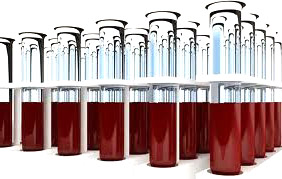Blood works understanding lab
Published: 7 May 2024

Medical Evidence Compilation for Healthcare Professionals
To facilitate efficient treatment planning, extensive research on specific illnesses and conditions is meticulously compiled in a comprehensive resource tailored for healthcare professionals.
Reliability of Medical Testing
As medical research rapidly advances, healthcare providers face challenges in staying abreast of the latest advancements. Evidence-based medicine has become increasingly vital, especially in the interpretation of lab blood test results. Standardized procedures ensure that samples undergo rigorous analysis, with results thoroughly cross-checked for utmost accuracy. These results serve as the cornerstone for both diagnosis and treatment decisions.
Blood Testing Procedures
Blood tests are typically conducted in hospital hematology departments or diagnostic centers. Based on test results and the severity of any potential illness, your physician will develop an appropriate treatment plan. In some cases, even with normal test results, residual concerns may persist.
Understanding Blood Test Results
To alleviate anxiety in children, a topical anesthetic is applied prior to blood draw. Understanding the results is crucial. If any uncertainties arise after receiving your results, don't hesitate to consult with your doctor.
Routine and Personalized Blood Testing
Blood tests are a common aspect of healthcare. When recommended for you, it's essential to discuss the reason and importance of these tests with your physician. Blood samples are generally collected from a vein in the elbow, but may also be drawn from the wrist in certain individuals.
To facilitate efficient treatment planning, extensive research on specific illnesses and conditions is meticulously compiled in a comprehensive resource tailored for healthcare professionals.
Reliability of Medical Testing
As medical research rapidly advances, healthcare providers face challenges in staying abreast of the latest advancements. Evidence-based medicine has become increasingly vital, especially in the interpretation of lab blood test results. Standardized procedures ensure that samples undergo rigorous analysis, with results thoroughly cross-checked for utmost accuracy. These results serve as the cornerstone for both diagnosis and treatment decisions.
Blood Testing Procedures
Blood tests are typically conducted in hospital hematology departments or diagnostic centers. Based on test results and the severity of any potential illness, your physician will develop an appropriate treatment plan. In some cases, even with normal test results, residual concerns may persist.
Understanding Blood Test Results
To alleviate anxiety in children, a topical anesthetic is applied prior to blood draw. Understanding the results is crucial. If any uncertainties arise after receiving your results, don't hesitate to consult with your doctor.
Routine and Personalized Blood Testing
Blood tests are a common aspect of healthcare. When recommended for you, it's essential to discuss the reason and importance of these tests with your physician. Blood samples are generally collected from a vein in the elbow, but may also be drawn from the wrist in certain individuals.
